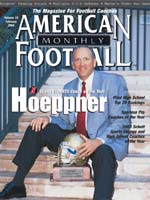AMERICAN FOOTBALL MONTHLY THE #1 RESOURCE FOR FOOTBALL COACHES
|
|
Article Categories
|
Schutt Sports I-A Coach of the Year Finalistsby: Richard Scott© More from this issue
PETE CARROLL
SOUTHERN CALIFORNIA
When Pete Carroll arrived at USC in 2001 with a 33-31 career in
four years as a head coach with the New York Jets and New England Patriots,
Trojan fans were understandably skeptical.
Over the past three years, Carroll has offered plenty of proof, with a 29-9 record
that includes a 12-1 record in 2003 and the national championship from The Associated
Press final poll.
I was very fortunate to get the opportunity to come here, Carroll
said. Its worked out great. Everything about it has been terrific.
Carroll, a 51-year old coaching veteran who built his reputation as a major college
and NFL defensive assistant, inherited a once-proud program that had fa....The full article can only be seen by subscribers.
Subscribe today!

|
|
|
NOT A SUBSCRIBER?
Subscribe
now to start receiving our monthly magazine PLUS get INSTANT
unlimited access to over 4000 pages of 100 percent football coaching
information, ONLY available at AmericanFootballMonthly.com!
|
|
|
HOME
|
MAGAZINE
|
SUBSCRIBE
|
ONLINE COLUMNISTS
|
COACHING VIDEOS
|
Copyright 2025, AmericanFootballMonthly.com
All Rights Reserved






